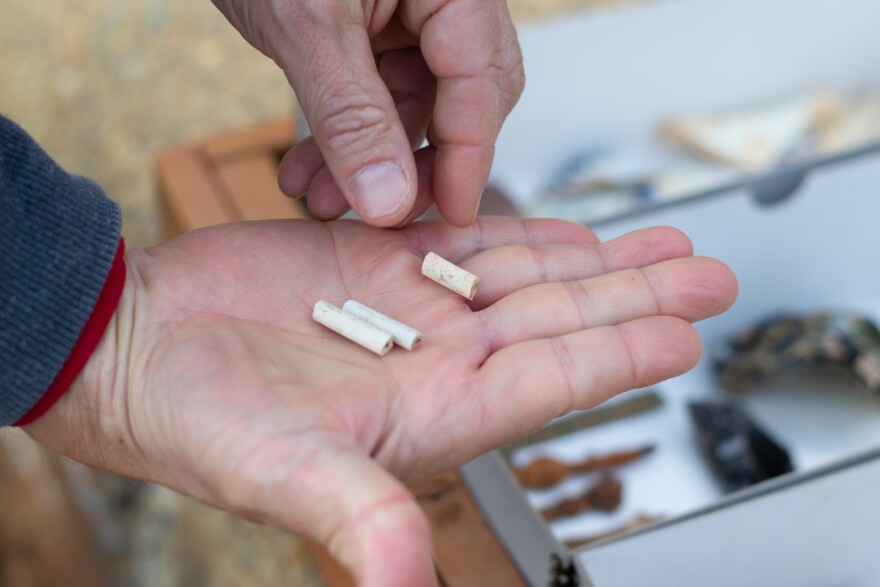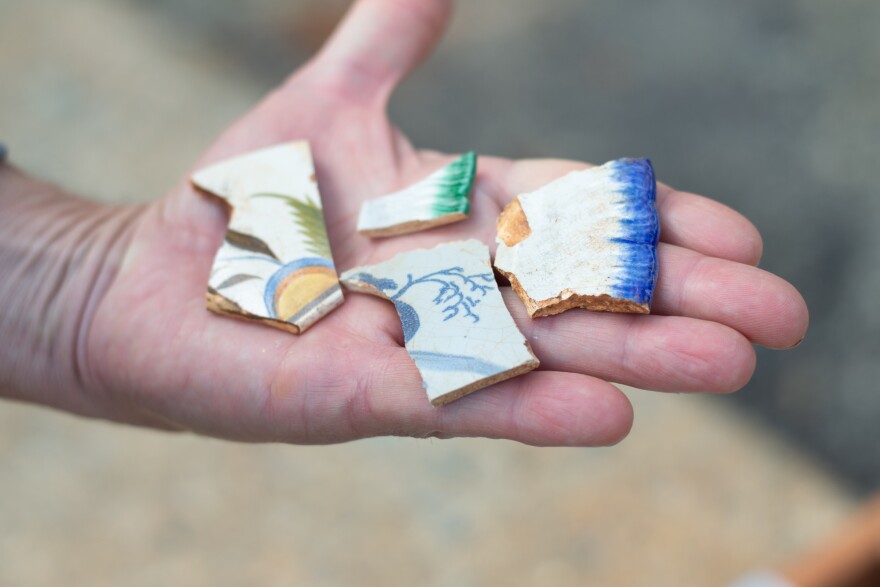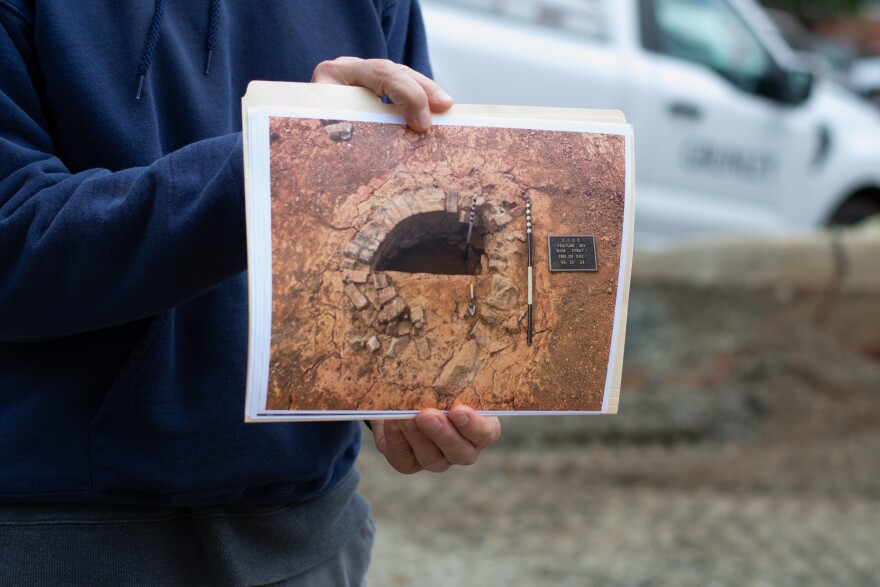An archaeological study in Charlottesville has revealed insights into life there in the 1700s. WMRA's Randi B. Hagi reports.
[traffic sounds]
The trash and misplaced belongings we leave behind when we move or pass away describe us. A pipe indicating that you smoked tobacco. A plate fragment showing you liked English imports.
These are the types of insights that Benjamin Ford is unearthing in downtown Charlottesville. He and his crew have excavated 275-year-old trash and storage pits that offer a glimpse into the lives of the area's earliest white and Black inhabitants.

BENJAMIN FORD: We feel that this site … is very significant to the history and development of early Charlottesville and Albemarle County. Not only understanding the history of this parcel as one of the earlier commercial developments, but also finding out more about the people who lived and worked here.
Ford and his company, Rivanna Archaeological Services, were contracted by Albemarle County to study the historic site of the Swan Tavern, under what was most recently a parking lot. It's about to be developed as a new general district courthouse for the city and county.
FORD: And the primary driver, the primary goal was to determine if there was a human grave on the property.
An 1824 newspaper article referenced in a book had suggested that Revolutionary War-era tavern owners John and Mourning Jouett might have been buried there.

BLAKE ABPLANALP: We at the county felt like, if there's the potential for hitting human remains and graves, and/or artifacts, that we have a responsibility to the community to pursue that.
Blake Abplanalp is the county's chief of facilities planning and construction. The new courthouse's price tag will top $31 million, not including furniture and other finishing touches. He said the initial site work and archaeological study combined added $175,000 to the cost.
ABPLANALP: But we felt like it was a worthwhile investment for our community.
The Jouetts were one of the first white families to settle in Charlottesville in the 1770s as part of the colonists' westward migration. They were heavily involved in the politics of the revolution. John Jouett Jr., who went by Jack, became known as the "Paul Revere of the South" for a daring midnight ride in 1781. Miranda Burnett, the research librarian at The Albemarle Charlottesville Historical Society, tells the tale.

MIRANDA BURNETT: Richmond has already been kind of captured and overrun by Benedict Arnold, so the legislature moved to Charlottesville to avoid being captured. So Tarleton then is being sent with his men to capture the rest of the legislature, and also … to capture the governor – who just so happens to be Thomas Jefferson. And so they are in Louisa County, and the story goes that Jack Jouett, Jr. overhears their plans and rides through the night that 40 miles … heading up to Monticello first to tell Jefferson, you know, "the British are coming."
So, back to the present – Ford and his crew were looking for Jack's parents' graves. First, they removed the asphalt, gravel, and topsoil from the site.
FORD: A human grave, just like any other feature that's dug into the red Albemarle clay, a planting hole or a utility, when you put the soil back in, you're going to see subtle texture and color differences.
But they didn't find any graves.

FORD: The problem with that is that John Jouett owned this property at his death in 1805 … but he owned 60 acres, so it's entirely likely that the Jouetts may be buried somewhere else on that historic 60-acre parcel.
Which means the couple could be spending the 'big sleep' somewhere else beneath downtown Charlottesville.
But, Ford did find a treasure trove of artifacts – somewhere between 7,500 and 10,000, with the earliest dating back to the 1750s. Rivanna Archaeological Services is now cleaning and processing the items. Among the findings are cow and hog bones leftover from the tavern vittles, pieces of a glass wine bottle, and a kind of soapstone pipe that Ford has seen before, at sites where free African Americans lived.
FORD: There's a soapstone quarry in southern Albemarle County, which, I believe, if I have the history right, Native Americans were utilizing well before European and African Americans moved into the area here. … We would presume that an artifact like that, a manually-carved soapstone pipe bowl may have been carved by African Americans themselves, either enslaved or free African Americans.

Based on tax records, Burnett said John Jouett, Sr. enslaved about 19 or 20 people. It's difficult to find many details about them.
BURNETT: So I did come across one deed in the Albemarle County deed book in which John Jouett is purchasing five slaves. It does give their names. So we had Nancy and her two children, Patsy and Jordan, and then two men – one named Fleming, and the other named Bartlett.
Ford's archival research has uncovered another man, named Adam Laws.
FORD: He's an interesting character. An enslaved man, purchased his freedom, established a family, a household, and may have actually built his own house here, which would have been in the 18-teens adjacent to the south side of Charlottesville, so probably in the vicinity of Water Street. But we're beginning to piece his life together as much as the records allow us.
To Ford's knowledge, the study's final technical report will be the first published account of Laws' life. It will be completed after all the artifacts have been processed.


